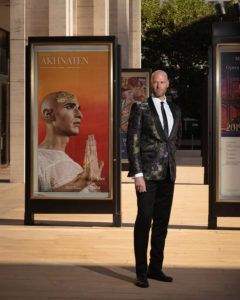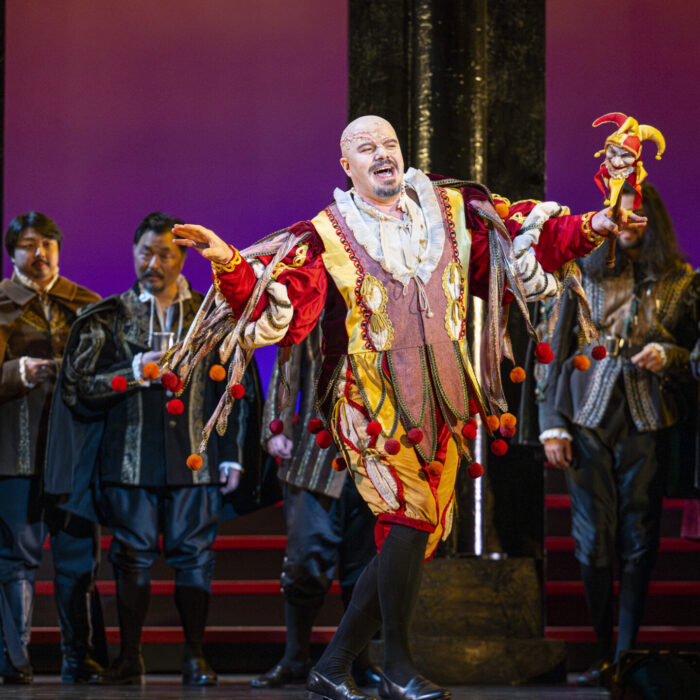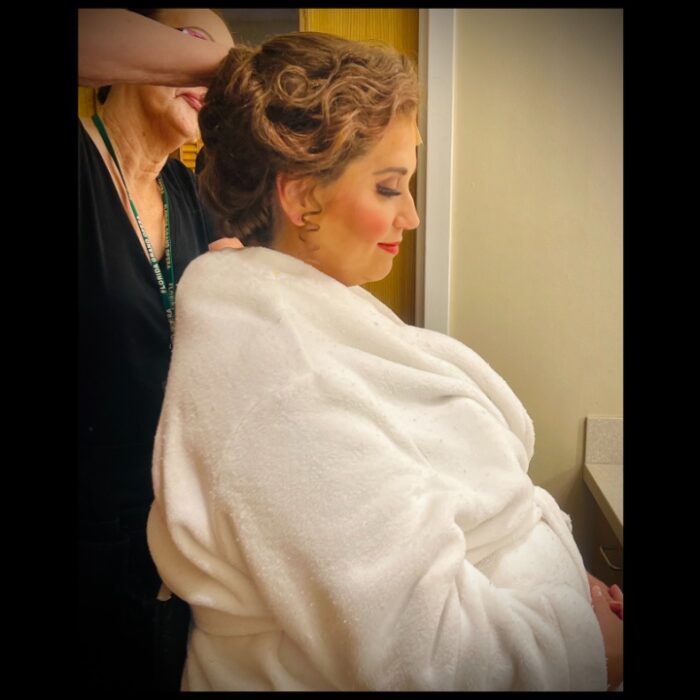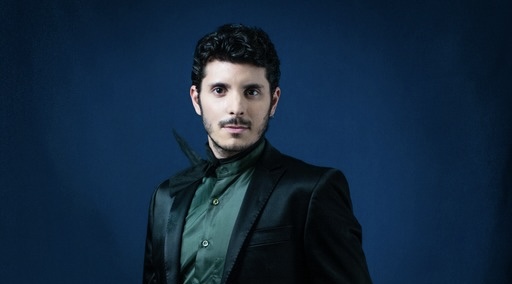
Q & A: Bass Zachary James on Auditioning for Philip Glass, ‘Akhnaten’ At the Met & Laying an Egg in ‘The Love for Three Oranges’
By Chris Ruel(Credit: Matt Madison-Clark)
Be careful around Zachary James.
In his role as the cook in Prokofiev’s madcap “Love for Three Oranges” with Opera Philadelphia, he wielded a lethal ladle. If you were a fan of ESPN’s show, “Great Outdoor Games” you may have seen him handling an ax as a lumberjack, promoting the show in a television commercial. The New York Times has called him a “Beast on stage.”
But offstage, and away from the camera, there’s little to fear. James is a down-to-earth singer with a ready laugh and a head full of show-business knowledge gained from having worked across mediums—from commercials and guest spots on television to five years on Broadway, and now, opera.
During his stint singing Broadway, he created the role of Lurch in “The Addams Family.” He’s been an original cast member in two Tony Award-winning productions, “Coram Boy,” and the revival of “South Pacific.”
Upon joining the opera world, he created the role of Abraham Lincoln in Philip Glass’ “The Perfect American,” as well as Terry in Missy Mazzoli’s “Breaking the Waves.” Zachary James has the world premiere thing down pat.
After James finished his run at Opera Philadelphia, he headed over to NYC to make his his Met debut, taking on the role of the Amenhotep/The Scribe in Philip Glass’ “Akhnaten.” The debut will mark his seventh appearance in a Glass opera, and his fourth time reprising a role that takes an enormous amount of emotional and physical stamina; this from a man who regularly did eight shows per week while on Broadway.
In this wide-ranging interview, OperaWire spoke with James’ about his journey to the opera stage, his very unconventional audition with Philip Glass, “Akhnaten,” and the zaniness of Opera Philadelphia’s “The Love for Three Oranges.”
OperaWire: Let’s start with the young Zachary James. Did you grow up in a family of musicians?
Zachary James: I actually did. My dad is a professional jazz and blues guitarist and teacher. I’d be in a playpen next to my dad while he taught guitar lessons out of our house. I’d go to gigs and see him play on these big stages—–it was pretty wild. Both of my grandmothers were pianists, so I guess you could say it was passed down. My dad put me on piano when I was four. That was the bulk of my childhood, which was cool.
OW: So, your first time on stage was when?
ZJ: It was when I performed as a child pianist. We did the competition circuits. It was a big thing for me to be sitting on stage and playing intense piano pieces as a kid.
OW: What about as a singer/actor?
ZJ: My first time in an acting role was in high school. We did “Grease.” It wasn’t something I was looking to do, but the theater and chorus teacher had no guys in this show, so they’d stand in the hallway and hand out candy bars to guys as they passed saying: “Hey, come audition for the musical.” He got the whole football team in musicals with candy bars.
OW: Who did you play?
ZJ: I was Roger, “King of the Mooners.”
OW: Switching from mooning to opera, what was your first encounter with opera?
ZJ: We were a big NPR (National Public Radio) family, and my mom would listen to the Saturday afternoon broadcasts. I have to say, when I heard it, I was like, please turn this off. But you know, I was a kid.
OW: What was the first live opera performance you saw?
ZJ: The first opera I saw was “The Rake’s Progress” at Florida State University. That blew my mind. I was so excited to see my first opera, but not really knowing what it was, I said to the usher as he handed me the program, “This is my first opera.” And, he said, “Oh, this is not a good first opera.” I’ll always remember that as kind of funny because I’ve done so much contemporary opera, I feel like that informs my taste.
OW: Tracing your trajectory from being a child pianist to high school musicals to connecting with opera, what made you want to become a professional stage performer?
ZJ: I think it was that moment in high school when I stepped on stage for the first time with the lights and the crowd, I knew that I wanted to be on stage I just couldn’t figure out how to do that.
I went to Florida State, and I was a percussion music ed major, and I was in the marching band at high school–which was my very favorite thing—so, I thought I wanted to be a high school band director, that was my big dream, but I couldn’t pass my snare jury.
I ended up switching my major to theater and got into that scene in Tallahassee. I started doing local productions and then full productions, and then, I realized I didn’t want just to act, I wanted to sing. So, I took voice lessons. Florida State is a big dance school—very dance and acting focused—but I wanted a degree that focused on singing because I needed that training. I ended up transferring to Ithaca College in Upstate New York and got a BFA in musical theater.
I studied with Carol McAmis, and without her, I wouldn’t be doing anything I do now. We’ve been together since 2002. While I was getting my degree, I did a summer stock season at Bucks County Playhouse and Pocono Playhouse. It felt like we did like a million shows; we performed “Oklahoma;” “Fiddler on the Roof;” “Joseph and the Technicolor Dreamcoat;” “Victor Victoria;” “Rocky Horror Picture Show;” “Footloose;” and so many other shows. I just didn’t have a great time. I said to Carol that I didn’t think I wanted to do the musical theater thing. She said, “Why don’t we look at some opera because your voice might fit in.”
We started dabbling in Mozart, and she gave me extra lessons and then sent me down the hall to Patrick Hanson, who was a coach and conductor at the time. Patrick said, “I’m going to call the Ash Lawn Opera (now the Charlottesville Opera), and I’m going to tell them that you’re going to audition for them. Then when you get there, you’re going to sing these two arias…” They really nurtured me and told me what to do. That was it; that’s how opera started for me.
When I got out of school, I did the Broadway thing for five years, but I’ve been in opera ever since.
OW: Let’s discuss your Met Opera debut in “Ahknaten.” This is your fourth time performing the role of Amenhotep/The Scribe.
ZJ: It’s a huge moment; it’s a dream, and yes, it’s my fourth “Akhnaten.” It’s the show I’ve done the most, which is wild. This will be my seventh Philip Glass production.
OW: How is it that you’ve performed in so many Glass operas?
ZJ: Phelim McDermott and I met while I was in “The Addams Family” during my Broadway days. In this interesting way, through “The Addams Family,” I ended up doing all this work with Philip Glass and Phelim.
“The Addams Family” was closing, and Phelim asked if I would audition for a crazy opera in which there’s a robot Abraham Lincoln (“The Perfect American”) and that Philip Glass was writing it. I said, “Yeah, that sounds great.” Afterward, I got this call to go to Philip Glass’ house in New York and audition for him in person.
I went to his house; we sat and talked for about an hour before he said, “I guess you should sing for me.” Then he’s like, “You know, I really don’t feel like playing the piano, do you mind singing acapella?” I sang a couple of arias from Floyd’s “Susannah,” and he responded by saying, “This will be a lot of fun working together.” So, Phillip Glass decided in his house that I should go to Madrid and London and do “The Perfect American.” I sort of didn’t believe it, but then I got the contract. That was the beginning of my Philip Glass / Phelim McDermott relationship.
OW: What was the genesis of your role in “Akhnaten?”
ZJ: I think it was 2016 when Phelim sent me a Facebook message asking if I could come to London the following week and if I knew how to juggle. I told him I’d go and that I could learn to juggle. The show was “Akhnaten,” and they kind of forgot to cast the part of Amenhotep/The Scribe, which is this enormous crazy role.
I showed up in London a week later, they handed me the score and libretto, and I got to work. It was totally crazy putting it on its feet so last minute. Philip came to see the production, along with the team from L.A. They were doing the show in L.A. the following fall but hadn’t cast the role, yet.
While I was out there performing, Philip said, “The Met’s doing the show, and I’m going to call them and tell them you’re going to do it.”
OW: With the Met production, you’re working with Anthony Roth Costanzo. That has to be fun.
ZJ: He’s incredible in the show. We have a pretty deep onstage relationship, and we’ve become close friends outside of the show.
In “Akhnaten,” I play his father figure, basically. The show opens with my funeral, and then I just watch him destroy everything I just built for two hours. Then he dies in my arms. It’s very intense stuff.
OW: What’s the biggest challenge when performing the role of Amenhotep/The Scribe?
ZJ: It requires an emotional vulnerability. Then there’s the juggling which is really terrifying because I was a kid who was afraid to catch and throw. Now, here I am in the spotlight juggling.
I’m onstage most of the show, that’s the other thing. It’s the first show I’ve ever done where I need just to lay down and not open my mouth for a day, and this is coming after having worked on Broadway where we did eight shows per week.
“Akhnaten” is physically and emotionally taxing because of the focus level, and that’s for all of us onstage. Anthony and I are the only ones who have done every production, so far, but everyone taps into this focus that becomes intense energy existing between all of us. We all have a responsibility for maintaining the balance, and that’s a heavy load to carry; it’s what makes the show. You can almost reach out and touch it.
OW: As The Scribe, you’re narrating the action. What’s that like?
ZJ: It’s 1600 words, not that I counted, of ancient texts from tombs, love poems that were carved into stone—it’s spooky stuff. You’re basically reciting things that the pharaohs had drafted and placed on enormous monuments to speak to all of eternity. They’re heavy words. Akhnaten himself was wiped out of history and discovered relatively recently. We bring to life these characters who perhaps would’ve never been discovered.
OW: Many of the artists I’ve spoken with talk about how wonderful it is to work with a living composer, getting direction and insight from the person who wrote the score. Have you found that to be the case, as well?
ZJ: Yes, absolutely. Philip Glass is a hero of mine. I listened to his works for years. I always say about Philip that you hear in his music the idea of something greater than yourself, like God, or the universe, or something powerful and enormous. That’s what it feels like doing “Akhnaten,” too; it’s something that takes over. I felt that when I saw “Satyagraha” at the Met, which was Phelim’s production, as well. You wake up at the end as if you were in a trance.
The number of world premieres I’ve done in which I’m in the room with a composer is just so special. Doing “Breaking the Waves” with Missy Mazzoli, we had two years of workshops for that show with Opera Philadelphia. We were all in a room with Missy and Royce Vavrek, and we got to have a voice in the process.
Missy would ask: “What’s the highest note you can sing; and what’s the highest note you can belt; and what would happen if you screamed on pitch, what would the highest note be?” So, it ends up that these things end up on the page. Other singers that weren’t in the world premiere cast look at it, and they think it’s impossible. How did anyone do this? But we’re just kind of voicing something from our hearts, and things came out naturally.
If you saw Missy wrote a high A-flat belted for a bass, you would think this is totally insane. Why would you do that? But because we had the time and space and freedom to create together and see what was possible, it becomes a very special experience.
OW: You recently performed in “The Love for Three Oranges” with Opera Philadelphia. You’re the cook with the lethal ladle.
ZJ: This production by Alessandro Talevi is just totally over the top. I keep thinking of “Alice in Wonderland.” At every turn, there’s some surprise, and the music is extraordinary and epic. Oh, and in this production, I’m also a chicken—I’m in an enormous chicken suit that makes me five-feet wide. It inhibits movement, so I had to figure out how to use it.
During rehearsal, Alessandro said, “I wonder if it would be possible for you to lay an egg.” The costume team came in and rigged the whole thing, so now I pull a string, and an egg drops out of my behind. It’s like, how can we make this opera crazier?
OW: Let’s finish with three things that make you tick and one piece of advice.
ZJ: Coffee. Then there’s outdoor time. When I’m not in rehearsal, I need to leave. I did “Tales of Hoffmann” in Nashville, and when not rehearsing, I was out on a mountain hiking, breathing in air, and being in the sun. That’s what really makes me thrive. And I like to travel.
As far as advice, I was told no a lot. I had many people tell me I would never do this, or this isn’t what you’re good at—my very first voice teacher said, “You’ll never be an opera singer,” and it was deeply hurtful. I was thinking; you don’t even know me, so why are you telling me what I can’t do.
I remember the first person who I told I wanted to be an actor when I was a kid. They said to choose something more realistic; you’ll never make money. There’s a sense of pride in proving them wrong and owning up to my own potential, doing something that people said wasn’t realistic or possible.
So, I would say, when someone tells you no, use it as encouragement and bouncing off point; a place to stretch your potential and see what you are capable of doing.
Categories
Interviews Stage Spotlight


